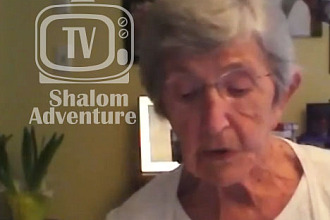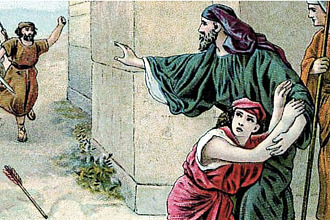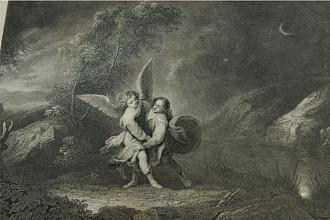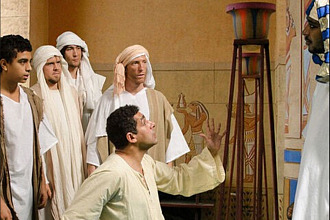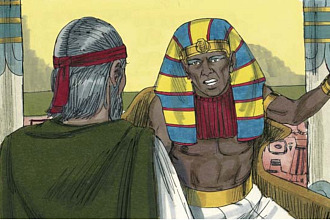Parasha: for the Week: Korach: Numbers 16:1-18:32.
Haftarah: 1 Samuel 11:14-12:22.
Besorat Yeshua: Mark 5:9-20.
Overview
Korach, Datan and Aviram, and 250 leaders of Israel rebel against the authority of Moshe. The rebellion results in their being swallowed by the earth. Many resent this and blame Moshe.
G-d's "anger" is manifested by a plague that besets the nation, and many thousands perish.Moshe intercedes once again for the people. He instructs Aharon to atone for them and the plague stops. Then G-d commands that staffs, each inscribed with the name of one of the tribes, be placed in the Mishkan.
In the morning the staff of Levi, bearing Aharon's name, sprouts, buds, blossoms and yields ripe almonds. This provides Divine confirmation that Levi's tribe is chosen for priesthood and verifies Aharon's position as Kohen Gadol, High Priest.
The specific duties of the levi-im and khanim are stated. The kohanim were not to be landowners, but were to receive their sustenance from the tithes and other mandated gifts brought by the people. Also taught in this week's Parsha are laws of the first fruits, redemption of the firstborn, etc.
"Korach"
Korach was a member of the tribe of Levi and a cousin of Moshe. Korach was a jealous person and when Moshe didn't appoint him to any position of leadership, he revolted against Moshe and Aaron. Korach also convinced 250 people from the neighboring tribe of Reuben to join him in the rebellion. The Torah states, "They assembled together against Moshe and Aaron and said, 'You take too much honor for yourselves." Korach argued that the entire congregation was holy and G-d was among them, thus, there was no need for Moshe and Aaron's leadership. "Your argument is not against us," Moshe reminded Korach, "but against G-d who commanded me whom to appoint to leadership." Moshe told the people to move away from Korach and his supporters. Moshe proclaimed, "If through a common death will these men die then the L-rd has not sent me. But if G-d will make the ground open its mouth and swallow them up together with all their belongings and they go down alive into the pit, then you shall know that these men have despised the L-rd." As soon as Moshe finished speaking, "The earth opened her mouth and swallowed them up together with their households and all their goods.”
After this, the "entire congregation" accused Moshe and Aaron, saying, "You have killed the people of the L-rd." As a result 14,700 men died in a plague. G-d told Moshe to take a staff from each prince of the 12 tribes, plus one from Aaron, and place them before G-d. The next day, Aaron's staff miraculously, "put forth buds and blossomed and bore ripe almonds." Moshe presented the rods to the people so they could see that G-d had indeed chosen Aaron.
Although the story of Korach took place over 3000 years ago, we read it yearly in the Torah, for the lessons of the Torah apply continuously. This is especially true of the lesson we should learn from Rabbi Eliezer who says in Pirkei Avot (chapter 4): "Envy, lust and the seeking of honor drive a person from the world." Jealousy is one of the worst qualities a person can possess. Korach was a very jealous person and as a result of his revolt against Moshe, not only he and his 250 followers died, but more than 14,000 people died in a plague.
“Kindness or Cruelty”
In response to Korach's rebellion, Moshe set forth a very strong response. The Torah states, "Moshe said, 'With this you shall know that the Almighty sent me to do all these things, I did not make them up." (Numbers 16:28). Moshe then goes on to tell Korach and his followers that they would die unnatural deaths (verses 16:29-35). This might appear very cruel on Moshe's part. To explain Moshe's reaction, the Alshich (a noted commentary) gives the analogy of a doctor who sees a need to amputate a person's hand or foot in order that a disease should not spread. Although this might seem cruel, it is really an act of kindness because it saves the person's life. Similarly, Moshe saw that Korach's rebellion was spreading and he had 250 followers already. In order to save the rest of the nation, Moshe, with his compassion for everyone else, had to use stringent measures.
True kindness at times will obligate us to use approaches that might appear very strict. However, the key factor is always our motivation for the entire situation. If someone sees a young child playing with matches and grabs them from him, the child will most probably cry and think that this person is very cruel. Only a person who is apathetic or callous would allow the child to continue playing with matches. Using harsh measures when they are not absolutely needed is cruel; failing to use harsh measures when they are the only approach available in order to help someone is also cruel. The person who is truly kind will weigh each situation carefully to see what is needed.
“Don’t Quarrel”
The Torah states: "There shall not be like Korach and his congregation." (Numbers 17:5) Gossip, critism, and negative talk about God's appointed leadership can be very destructive. Korach's actions matched those of lucifer in heaven and are matched by many people still today. Most people are not able to see things from all the angles, variables, and with all the information that the leader has. Yet we often try to second guess them and stir up negative feelings by sharing our disagreements with other people. There is a correct way to make our opinions known and there are incorrect ways. Korach chose the incorrect way and was swallowed up. That would have been bad enough, but the negative influence on others was even worse. We should learn to be quick to listen and slow to speak. We should also learn to close our ears to the negative talk of others.
"Self-Interest"
When Moshe reprimands Korach for seeking the priesthood, he concludes: "Therefore, you and your congregation who gather together are against the Almighty; and Aharon, who is he that you complain against him?" (Numbers 16:11). When people speak against us they are really speaking against God. When we come in contact with a very critical person, we need not take offense at what he says. This is the way he speaks to all people so there is no reason to take it personally. Realize that the problem is his, not yours, and you free yourself from any possible hurt feelings from what he says.
“Do You Do Your Part?”
Rabbi Levi Yitzchak of Barditchev once saw a man running about frantically in the marketplace. He stopped the man and asked him, “What are you doing?”
The man barely gave the Rabbi a glance and replied, "Sorry Rabbi, I'm very busy and I don't have time to talk to you now." But Rabbi Levi Yitzchak persisted. "Tell me, why are you in such a rush? What you are doing?" The man replied, "Can't you see, Rabbi. I'm trying to make a living. That’s what I'm doing." "You are making a mistake!" replied the Rabbi. "Making a living is G-d's doing. What you have to do is make the proper vessel for G-d's blessings to descend. The study of Torah, to be faithful to the mitzvot and giving charity is included in what you have to do. My question was, "What are YOU doing? Are you living up to your part?"
“God’s Mercy”
In Pirkei Avot, Rabbi Yochanan ben Zakai asked five of his students, "Go out and see which is the good way to which a person should cling?" Each of the five had a different idea. His disciple, Rabbi Yossi said, "to have a good neighbor." When Rabbi Yochanan ben Zakai said, "Go out and see which is the evil way from which a person should keep far away?” Rabbi Yossi replied, "A bad neighbor!" Thus, from the story of Korach we see the importance of having a good neighbor and how much one must avoid a bad neighbor. The Talmud tells the following story. In Rabbi Meir's neighborhood there lived bad people, who annoyed him so much that he prayed for them to die. Rabbi Meir's wife Beruriah said to him, "It says (Psalms 104), 'Let sins be consumed' not sinners!" Instead of praying for their demise, you should better seek G-d's mercy that they should repent and not be wicked anymore!" Rabbi Meir listened to his wife and sought G-d's mercy on their behalf and they indeed repented.
Haftarah: 1 Samuel 11:14 – 12:22
Parasha: In the text of the parasha the people of Israel are not happy that Moses and Aaron are keeping the great responsibilities of governance and priesthood to themselves. Moses and Aaron were brothers and it seemed to the people and especially to 250 leaders who were influenced by Korach that a conflict of interest had occurred. "You have gone too far! All the congregation are holy, everyone of them, and the LORD is among them. So why then do you exalt yourselves above the assembly of the Lord?” (Num 16:3)
Haftara: In our haftara the people of Israel challenge the authority of Samuel and God and decide to have a new king. But Samuel is not satisfied and wants to be sure that nobody accuses him of anything wrong during his time of leadership. "I have listened to you in all that you have said to me, and have set a king over you. See, it is the king who leads you now; I am old and gray, but my sons are with you. I have led you from my youth until this day. Here I am; testify against me before the LORD and before his anointed. Whose ox have I taken? Or whose donkey have I taken? Or whom have I defrauded? Whom have I oppressed? Or from whose hand have I taken a bribe to blind my eyes with it? Testify against me and I will restore it to you." (1Sam. 12:1-3). The people confirmed to Samuel that they have no reproach against him. "You have not defrauded us or oppressed us or taken anything from the hand of anyone." (1Sam. 12:4). Samuel recalls to the people of Israel all the mistakes they have made during their history from the time of Jacob to the present. The Lord confirmed Samuel by sending thunder, "and the LORD sent thunder and rain that day; and all the people greatly feared the LORD and Samuel (1Sam. 12:1-3). Samuel confirmed to the people of Israel that God's love is unconditional. Samuel said to the people, "Do not be afraid; you have done all this evil, yet do not turn aside from following the LORD, but serve the LORD with all your heart; For the LORD will not cast away his people, for his great name's sake, because it has pleased the LORD to make you a people for himself.” (1Sam. 12:21-22).
Besorat Yeshua: Mark 5:9 - 20
Parasha: In the text of the parasha we have the story of the rebellion of Korach. When we look carefully at this text we recognize the principle of the first rebellion, the great rebellion of Satan: You said in your heart, "I will ascend to heaven; I will raise my throne above the stars of God ... I will make myself like the Most High.” (Is 14:13-14).
Korach wanted to make himself like Moses. We know that Moses and Aaron were appointed by God and when Korach challenged the authority of Moses and Aaron, he challenged the authority of God. This rebellion was possible because Korach was possessed by the same spirit as Satan. He was trying to flatter or to charm the people of Israel when he said "All the congregation are holy." (Numb 16:3) In this story we have a case of demonic possession. That's why the punishment of God was so exemplary.
Besorah: In the Besorah of Mark we have a parallel story, a story of demonic possession. It is about the possession of a man. "And when he had stepped out of the boat, immediately a man out of the tombs with an unclean spirit met him. He lived among the tombs; and no one could restrain him anymore, even with a chain." (Mark 5:2-3). Yeshua recognized that this man was possessed by one or several demons, fallen angels. He asked them a question: "What is your name?" He replied, “My name is Legion; for we are many.” (Mark 5:9).
They knew who Yeshua was and begged him earnestly not to send them out of the country. Now a great herd of swine was feeding on the hillside there and the unclean spirits begged him, "Send us into the swine; let us enter them." (Mark 5:10-12). Here we see the great power of Yeshua who gained victory over evil, Satan and all demons, "So he gave them permission. And the unclean spirits came out and entered the swine; and the herd, numbering about two thousand, rushed down the steep bank into the sea, and were drowned in the sea" (Mark 5:13).







